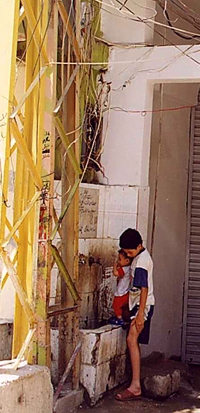
In September 1990 when the constitution was amended, there was no opposition against the following modification introduced in the preamble: "there shall be no settlement of non-Lebanese in Lebanon." The leader of camp Ain Al-Hilweh does not blame the Lebanese for their reluctance to accept the Palestinian burden. "I have a good relationship with the Lebanese," said Maqdah, who blames the Israelis instead for "the difficult situations" between Lebanese and Palestinians over the years. "Israel created problems for us both," he said.
Despite a feeling of being a pawn in other nations' games, Maqdah agrees with the Lebanese desire to get his people out of Lebanon. For him, though, the one final solution lies in the creation of a Palestinian state. Imad El Khali, journalist and producer of a documentary for French TV on the economic conditions of the refugee camps in Lebanon agrees that the country has no choice but to get the Palestinians back to Palestine. "Economically, the Palestinians have no hope (here) and Lebanon cannot contain them," he said.
The issue of the Palestinians' destiny is so delicate that when Secretary of State Madeleine Albright visited Lebanon recently to discuss the peace process with the Lebanese authorities, she refused to discuss it, saying that it should be left to the final status talks between Israel and the Palestinian Authority. Her comment drew criticisms from Lebanese Prime Minister Selim Hoss who said that Lebanon should be a negotiator in any such talks because it hosts so many refugees.
According to El Khali, there are other, more human factors, like the Palestinians themselves, who ought to be involved in the peace process. "Real peace is made with people, not with governments," he said. Unless the feelings of refugees like Maqdah are taken into consideration, the peace negotiations might not end in peace.
Previous Page
USEFUL LINKS
WHO ARE WE?
CONTACT US
FEATURE STORIES
Caught in the cross fire: Is Beirut Ready for Tourism?
Marriage: Lebanese Style
Meet Lebanon's only Male Belly Dancer
Beirut Blues
Christians Looking for a Better Future
The Woman Behind the Walls

Back to Home Page